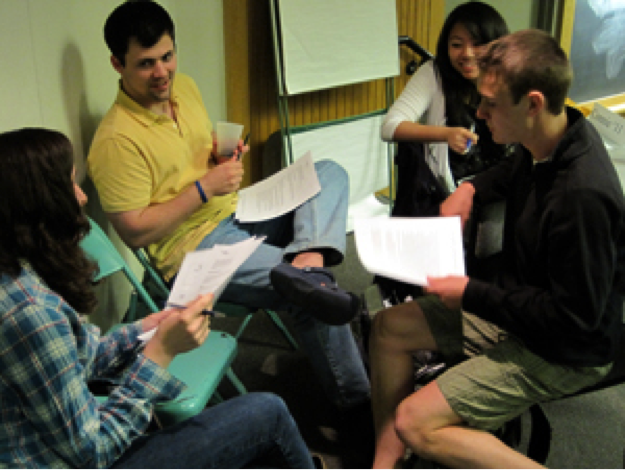- Public Policy
- Leadership
- Funding
- News & Events
- About the Center
Back to Top Nav
Back to Top Nav
Back to Top Nav
Back to Top Nav
This ongoing series explores sessions of the Management and Leadership Development Program (MLDP) through participant narratives. MLDP is a one-term program designed to develop citizen leaders among sophomores, juniors, and seniors at Dartmouth College. Led by expert guest speakers each week, sessions employ experiential teaching techniques to engage students through hands-on learning of core management and leadership skills.
 |
| MDLP Participants discussing meeting scenarios |
Boring and inefficient meetings can be a thing of the past, Lebanon City Councilwoman Karen Liot Hill told students during the sixth session of MLDP on Tuesday. Much of the responsibility for how to make meetings easier and more engaging lies with the meeting's facilitator.
Facilitators have many responsibilities when conducting a meeting. Good facilitators will encourage participation, maintain focus, incorporate feedback, and help build agreements within the group dynamics. Liot Hill gave students advice for how to make meetings efficient and fun based on her experience as mayor, including the Facilitation Framework Triangle, which gives three main points of facilitation: know outcomes/goals group is trying to achieve, what is the process/structure they have agreed to use, what is the interactions in the group/between the people.
Facilitators should try to remain neutral during the meeting and should never impose a solution or push a selfish agenda. "A facilitator is the standard setter to a discussion, so the confidence and energy that you bring to the room can really affect the group," Liot Hill said. Liot Hill suggested a number of activities in order to get group participants engaged, including brainstorming, random entry, and "NOSTUESO," which stands for "no one speaks twice until everyone speaks once."
The session ended with performances from the "MLDP Drama Troupe," in which students separated into groups and then acted out bad meeting situations and played the role of particularly troublesome participants.